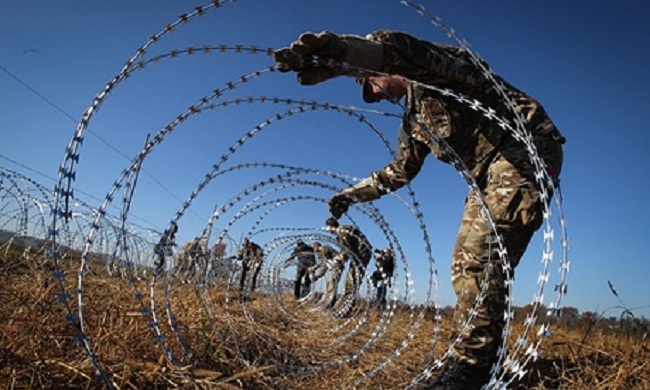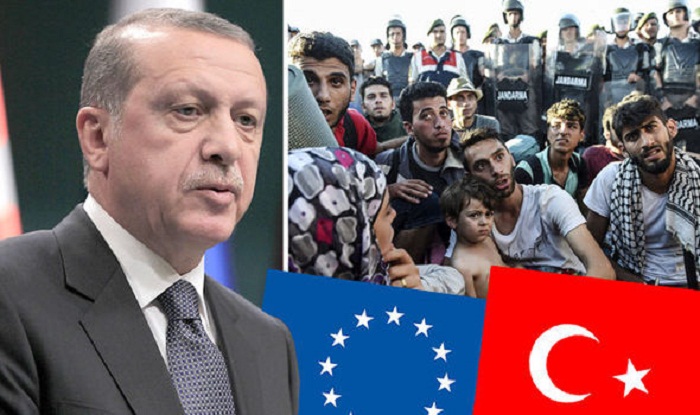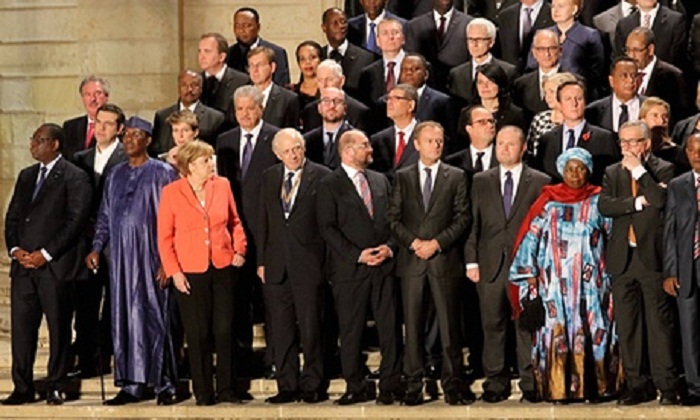In return, Ankara would get €3bn over two years and the EU would also probably agree to resettle hundreds of thousands of refugees in Europe directly from Turkey.
No EU country, not even Germany, has committed to paying its share of the €3bn bill except Britain. In what appears to be a unique event in David Cameron’s chequered history of relations with the EU, the prime minister, while in the Maltese capital of Valletta, offered €400m for the Turkey plan, the only financial pledge yet delivered. That figure is roughly in line with a breakdown of expected national contributions by the European commission and would make Britain the second biggest participant after Germany.
 ""
""The prospect of a breakthrough with Turkey is tantalising for Merkel, for whom the refugee crisis has posed the biggest problem in 10 years of power. This week her finance minister, Wolfgang Schäuble, likened the arrival of almost 800,000 newcomers in Germany this year to an “avalanche” and appeared to blame the chancellor for the situation by stating that “careless skiers can trigger avalanches”.
Facing tumult within her governing coalition and her own party, Merkel looks like a leader seeking relief in a hurry.
An emergency EU summit in Valletta heard from EU negotiators on Thursday that Erdoğan was demanding two quick moves by the Europeans to pave the way for a deal – €3bn over two years and a full summit. Senior EU sources said the message from Ankara was that the price tag would rise if it was not accepted now.
Merkel wasted no time in agreeing, witnesses to the closed-door summit exchanges said. She told her fellow EU leaders that she was ready to put money on the table and proposed 22 November as the summit date. She later said the date was not set because it had to be agreed with Ankara, but that it would be around the end of the month. The French president, François Hollande, echoed that view.
The summit would demonstrate the “very close cooperation” between the EU and Turkey on the refugee crisis, said Merkel, although there has been minimal cooperation so far.
Turkey is home to 2.3 million Syrian war refugees and at least 500,000 of them have crossed into Greece this year before trekking through the Balkans heading for Germany. Merkel has long been convinced that a deal with Erdoğan is the key to what she describes as the biggest challenge of her career. But there is strong scepticism across the EU that the increasingly authoritarian Erdoğan is a reliable partner who will deliver, as well as strong reservations about his record on civil and human rights.
Merkel emphasised that both sides had a “strong interest in sharing the burdens” set by the refugees and said any deal would need to include a commitment from Ankara to take back non-Turkish migrants who entered the EU via Turkey. In return the EU would speed up moves to loosen visa requirements for 75 million Turks travelling in the EU, a key demand of Erdoğan.
“This process can be accelerated,” said the German chancellor.
Hollande said he wanted the EU budget, rather than national governments, to bear most of the costs of the deal. Under commission plans, the EU budget would supply €500m and the 28 governments €2.5bn.
Turkey would be expected to open its labour market to Syrian refugees and to improve schooling for the estimated 900,000 Syrian children in Turkey. The EU funds would facilitate this, Merkel said.
A main aim, she added, was to make “illegal migration” to Europe from Turkey “legal”. This suggests that the putative agreement would entail the EU taking a set number of refugees directly from Turkey every year. In Berlin’s thinking, they would then be spread fairly and on a permanent basis across the EU, a notion that is extremely divisive and contentious.
There are various aspects of the proposed Turkey deal that will run into trouble in the EU. Turkey, for example, would need to be declared a “safe country of origin” for refugees to be returned there. Merkel is pushing for that but Sweden opposes it.
And while any Turkey deal will not solve the EU’s worst migration crisis, it should help Merkel out of an extremely exposed political predicament at home, allowing her to argue that she is creating order out of chaos, establishing control and predictability over the refugee flows, reducing their numbers and containing the crisis.
Her vulnerability was highlighted by Schäuble’s incendiary remarks. “I don’t know whether we are at the stage where the avalanche has already reached the valley or whether we’re still at the top of the slope,” he said.
“If we are still at the top, we Germans cannot cope with this alone ... You can trigger an avalanche when a rather careless skier goes on the slope.”
While Turkey dominated the emergency EU session, the meeting was preceded by two days of tense summitry with more than 30 African leaders where the EU offered almost €2bn in return for African help in the deportation of unwanted migrants from Europe.
 ""
""African leaders complained that the amount of money was inadequate and “just a start” following two days of fierce negotiations that continued for 21 hours until 5am on Wednesday before the various parties could agree on a compromise package that was described by participants as “lowest common denominator”.
“There was very little trust between the sides,” diplomats reported. “There was a lot of tension over the way that the EU handled this.”
Even if implemented, the accords will have little quick appreciable impact on the current crisis. The summit was called six months ago when the focus of the refugee movements was across the Mediterranean from Libya to Italy. Since then, the Mediterranean route, which many Africans used, has been supplanted by the mass arrivals of Syrians and Iraqis in Europe via Turkey and the Balkans.
The Europeans sought to use the Valletta summit to cajole African governments into cooperating on receiving migrants sent back from Europe, while African leaders tried to use the meetings to force the Europeans to open up more legal channels for their people moving to Europe.
“For the Africans the summit has been a huge opportunity to push their priorities,” Helen Clark, the former New Zealand prime minister who heads the UN Development Programme, told the Guardian.
“One of the most important points here is to push for legal migration. There’s a nod towards that. People end up in the European labour market anyway.”
More about:
















































